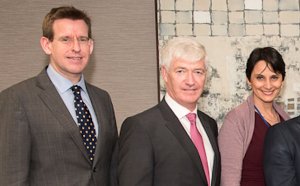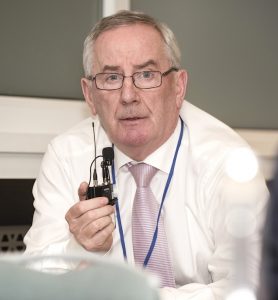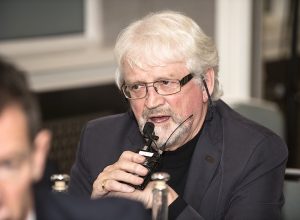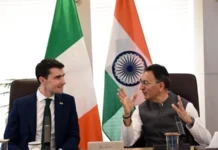
The presentations made by Veronica Manfredi, Head of Unit 2, Consumer and Marketing Law, European Commission, and by David Hodnett, General Counsel, Commission for Aviation Regulation, generated a lively Q&A session at the inaugural Irish Travel Industry Summit organised by Irish Travel Trade News and chaired by Martin Skelly, Travalue.ie. The following is an edited transcript of the Q&A session.

Neil Steedman: How many of the 28 Member States are likely to meet the 1st January deadline – or should that be 27?
Veronica Manfredi: Until March 2019 we are 28 and we continue to work with the UK and in the consumer policy area we particularly regret Brexit because the UK has always been a very good partner. As for meeting the deadline, maybe 50%? I have to say that transposition of the Directive has run a little bit late.
Neil Steedman: How confident is the Commission for Aviation Regulation that Ireland will meet the 1st January deadline and, to date, what have you seen as being the main concerns about the new Directive among Irish travel agents?
David Hodnett: The main concerns that we have noted from our dialogue would be the general harmonisation effect, the scope of the Directive, and insolvency arrangements, and then technical matters such as cooling off periods, right to cancellation, concurrent liability, and finally the transposition. In relation to the transposition date, the Department of Transport are working on that and they have written to the European Commission to say that they anticipate using the mechanism in the European Communities Act 1972 whereby they will introduce the transposition by way of secondary legislation, which is a lot quicker than primary.

Pat Dawson: The ITAA has met the CAR several times and also we have written various consultation documents, but reality has to prevail here. For example, if you have a travel agent in Portugal trading in Ireland and selling package holidays to Irish consumers, how does the public know what cover those people have – and will the Commissioner explain to the Irish consumers that if you have a Portuguese licence or you have an Irish licence that the cover will be much different?
I don’t for one minute feel that the legislation, even on 1st July, will be enacted in Ireland because our Association has looked at what’s coming down the track with legislation and there doesn’t appear to be any focus from our Minister for Transport in order to move that along.
The second more serious thing is the Linked Travel Arrangements and that is to capture, of course, airlines, who are now competitors of travel agents, and who sell many products on their websites to the consumer. There has been Monarch and Air Berlin, for example, and also Malev, who went into liquidation nine years ago and there is $19 million sitting there belonging to travel agents and no-one can get their hands on it. We feel as travel agents that the Linked Travel Arrangements will not come to pass because the airlines are very powerful and they will force the issue and we will be back to an un-level playing pitch – and the only thing we are looking for is a level playing pitch.
David Hodnett: Let’s say you have a travel agent in Portugal selling packages into Ireland. My impression of how the Directive anticipates the market to develop and to work is that that person would be bonded in Portugal and have insolvency arrangements in place in Portugal. In Ireland it is likely that the Commission for Aviation Regulation will be designated as the central contact point for Ireland for the Directive, which will allow us, amongst other things, to, if necessary, find out what level of insolvency protection that entity has and, if it has none, essentially bar it from trading in Ireland. That is how the Directive sees the market developing.
In terms of the overall level of insolvency put in place, the Directive foresees that each Member State will put in place its own approach. My understanding is that there will then be some monitoring at an EU level to ensure that the levels across Member States are essentially comparative so that there isn’t a race to the bottom. I think we will just have to be active in how that is implemented, once it is implemented.
It looks like there will be a much bigger monitoring role associated with this. Originally if you wanted to trade in Ireland you had to have an Irish licence – that was the monitoring ‘hook’ from the State side. In the future, because you are creating a harmonised internal market we on the Irish side have to rely on our partners in the European Union to effectively bond the travel agents and tour operators in their own Member States, so there will be a lot more give and take between organisations such as the Commission for Aviation Regulation and the CAA in the UK and so on and so forth in relation to ensuring that travel agents and tour operators that are trading are correctly bonded.
Veronica Manfredi: The European Commission is working on an IP network to put together these central contact points, which are being appointed by the Member States as we speak, because there is a specific mechanism enshrined in the Directive to make sure that, for example, if ever the Irish authorities have some doubts about the effectiveness of the Portuguese insolvency protection system the Irish and the Portuguese central contact points can exchange information – actually there is a deadline of maximum 15 days by which the Portuguese authorities have to reply and if failure to do so is monitored centrally by the European Commission and Ireland can raise their hand and say we have serious doubts that the insolvency protection scheme is working.
It is part of the European Commission’s task as guardian of the Treaty to check the correct implementation of the Directive as such and we will be very effective here and complaints may come from business associations, individual businesses or travellers to make sure that everything is moving as smoothly as possible.
As regards airlines being powerful, not complying with Linked Travel Arrangement mechanics, it’s a matter of enforcement. The Commission is working very robustly on making our overall public and private enforcement work better for the future, because this is the heart of the matter. Airlines will have the possibility to either continue working in this business field of offering additional travel services or not, but if they do they must comply with the new rules of the game. I don’t see that they will be able to easily escape. There will be consumer organisations and business associations entitled to bring legal actions if they see major cases of failure of compliance. If nothing is ever reported then this will really be, per se, a failure, but I am pretty sure that will not happen.

Michael Doorley: The legislation will come in no doubt and it’s very good and very positive and will give good protection for consumers. There might be some small changes for us to get our heads around, but that’s fine, we can do that, but as we have seen over the years when the legislation was brought in in Ireland monitoring the situation seems to be the difficulty – I mean practical monitoring on the ground – and we know we have a history here, of say, the GAA club organises and acts as a travel agent, and we have seen all sorts of situations like that over the past 10 or 15 years.
Have CAR any plan in mind and have they been given a sufficient budget to monitor and take action against anyone illegally trading under the new legislation?
David Hodnett: What we have tried to do under the current legislation is as much as possible respond to complaints on illegal trading. For the next suite of legislation firstly we have to see what it looks like and, if we are designated, which we think we will be, to enforce it, and on that basis whether the new legislation will put the responsibility on permanent organisers, which like the 1995 Act is likely to occur. So at that point there will be a monitoring role for the Commission and that will give us an opportunity to raise it with the Department of Transport to say if they are going to give that to us we may need extra resources. If it is going to be an issue certainly the people whom we will want to be hearing from are people active in the industry who think their own practices are being subject to unlawful activity in the area.

Enda Corneille: On the Linked Travel Arrangements is the legislation aimed at the customer who purchases a flight ticket and maybe books car hire with Hertz, say, on the airline’s website, is that linked travel? So if the airline is forced or otherwise to take insolvency protection what’s the insolvency protection protecting? Is it against the airline going bust or Hertz going bust?
David Hodnett: Airline insolvency. Emirates going bust.
Enda Corneille: From a customer booking a car?
David Hodnett: The Linked Travel Arrangement is saying if the airline goes bust such that the customer can’t benefit from the contract that’s put in place, the flight plus the car hire, Emirates in that situation would have to refund the customer the price of the flight ticket and the car hire.




